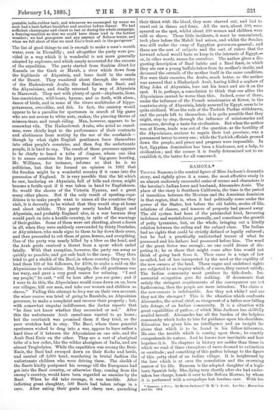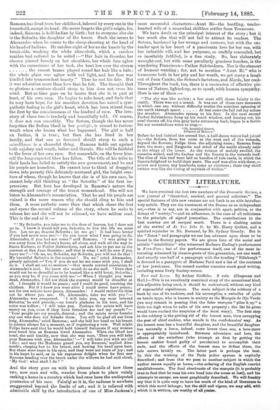RAMONA.* THOUGH Ramona is the central figure of Miss Jackson's
dramatic story, and rightly gives it a name, the most effective study in an almost uniformly successful series of scenes and characters is the heroine's Indian lover and husband, Alessandro Assis. The place of the story is Southern California, the time is the period of transition between the Mexican and the American dominion in that region, that is, when it had politically come under the power of the States, but before the old habits, modes of life, relations of classes, and tenures of property had passed away The old system had been of the patriarchal kind, favouring indolence and wastefulness generally, and sometimes the growth of petty tyrannies, but, on the whole, bringing out a kindly relation between the ruling and the subject class. The Indian had no rights that could be strictly defined or legally enforced ; but be had a practically undisturbed tenure of what he possessed and his fathers had possessed before him. The word of the great Senor was enough ; no one could dream of dis puting it; he or those that might come after him would not think of going back from it. Then came in a reign of law so-called, but of law interpreted by the need or the cupidity of the new owners of the land. These vague and undefined rights are subjected to an inquiry which, of course, they cannot satisfy. The Indian community must produce its title-deeds. Im memorial occupation goes for nothing. If documents that satisfy the stringent requirements of the conveyancer are not forthcoming, then the people are mere intruders. The claim o the new-comers is indefeasible. Are they not white ? and are they not the stronger ? This is the situation which confronts Alessandro, the actual chief, as vicegerent of a father now falling into dotage, of an Indian community. It is a situation with great capabilities of pathos, of which Miss Jackson has skilfully availed herself. Alessandro has all the burden of the helpless community which looks to him for guidance upon his shoulders. Education has given him an intelligence and an insight far above that which is to be found in his fellow-tribesmen.
He sees the trouble which is coming upon them ; he exactly comprehends its nature. And he knows how inevitable and how hopeless it is. No chapters in history are sadder than those in which we read of these champions of races doomed to extinction or servitude ; and something of this pathos belongs to the figure of this petty chief of an Indian village. It is heightened by the love which is at once the consolation and the crowning sorrow of his life. Ramona is the adopted daughter of a high
born Spanish lady. She, dying very shortly after she had undertaken her charge, hands it over to the Senora Moreno, by whom it is performed with a scrupulous but loveless care. With her
Ramona has lived from her childhood, beloved by every one in the household, except its head. She never forgets the girl's origin, for, indeed, Ramona is half-Indian by birth ; but to everyone else she is the Senorita, the daughter of the house. Such she seems to Alessandro when he comes to the sheep-shearing at the head of his band of Indians. He catches sight of her as she kneels by the brook-side, washing the white altar-cloth, which a careless maiden had suffered to be soiled :—" Her hair in disorder, her sleeves pinned loosely on her shoulders, her whole face aglow with the earnestness of her task, she bent low over the stream the sunset beams played round her hair like a halo ; the whole place was aglow with red light, and her face was kindled into transcendent beauty." Thus he met his fate. But it was adoration more than love that he felt. The thought that so glorious a creature should stoop to him does not cross his mind. But as time goes on he learns that she is, in part at least, of his own race. He begins to take heart, and finds that he may have hope, for his manifest devotion has raised a sympathetic feeling in the girl's heart, which has been stirred from the first by the consciousness of the kindred of race. The lovestory of these two is tenderly and beautifully told. Of course, it does not run smoothly. The Senora, though she has never forgotten the Indian blood in her prot6gee, is roused to furious wrath when she learns what has happened. The girl is half an Indian, it is true ; but then she has lived in her family, and that one so favoured should stoop to such a mesalliance is a shameful thing. Ramona holds out against both cajolery and wrath, bribes and threats. She will be faithful to the lover of her own race. But meanwhile, on the lover himself the long-expected blow has fallen. The title of his tribe to their lands has failed to satisfy the new government, and he and his people are homeless. He cannot bear to think of dragging down into poverty this delicately-nurtured girl, the bright crea ture of whom, though he knows that she is of his own race, he cannot help still thinking as " the Senorita" of his first impressions. But love has developed in Ramaua's nature the strength and courage of the truest womanhood. She will not listen to Alessandro's renunciation. That he and his people are rained is the more reason why she should cling to him and them. A more pathetic scene than that which closes the first and opens the second volume of the story, where he seeks to release her and she will not be released, we have seldom read. This is the end of it :—
" My Senorita, you take me to the door of heaven, but I dare not go in. I know it would kill you, Senorita, to live the life we must live. Let me go, dearest Senorita ; let me go ! It had been better if you had never seen me.'—' Do you know what I was going to do, Alessandro, if you had not come ?' said Ramona. I was going to run away from the Senora's house, all alone, and walk all the way to Santa Barbara, to Father Salvierderra, and ask him to put me in the convent at San Joan Bautista; anfl that is what I will do now if you leave me Oh no, no, Senorita, my Senorita, you will not do that I My beautiful Senorita in the convent ! No, no !' cried Alessandro, greatly agitated.—' Yes, if you do not let me come with you, I shall do it. I shall set out to-morrow:—Her words carried conviction to Alesaandro's soul. He knew she would do as she said. Even that would not be so dreadful as to be hunted like a wild beast, Senorita ; as you may be, if you come with me.'—' When I thought you were dead, Alessandro, I did not think the convent would be dreadful at all. I thought it would be peace ; and I could do good, teaching the children. But if I knew you wero alive I could never have peace • not for one minute have peace, Alessandro ! I would rather die thhi; not be where you are. Oh, Alessandro, take me with yon!'— Alessandro was conquered. I will take you, my most beloved Senorita,' he said gravely,—no lover's gladness in his tone, and his voice was hollow ; I will take you. Perhaps the saints will have mercy on you, even if they have forsaken me and my people !'— Your people are my people, dearest ; and the saints never forsake any one who does not forsake them. You will be glad all our lives long, Alessandro,' cried Ramona; and she laid her head on his breast in solemn silence for a moment, as if registering a vow. Well might Felipe have said that he would bold himself fortunate if any woman ever loved him as Ramona loved Alessandro. When she lifted her head, she said timidly, now that she was sure, Then you will take your Ramona with you, Alessandro ! I will take you with me till I die ; and may the Madonna guard you, my Ramona,' replied Alessandro, clasping her to his breast, and ?bowing his head upon hers. But there were tears in his eyes, and they were not tears of joy ; and in his heart be said, as in his rapturous delight when he first saw Ramona bending over the brook under the willows he had said aloud, ' My God ! what shall I do !' "
And the story goes on with its piteous details of how these two, now man and wife, wander from place to place vainly seeking a home in a country which had once been the undisputed possession of his race. Painfil as it is, the sadness is nowhere exaggerated beyond the limits of art ; and it is relieved with admirable skill by the introduction of one of Miss Jackson's most successful characters—Aunt Ri—the bustling, tenderhearted wife of a somewhat shiftless settler from Tennessee.
We have dwelt on the principal interest of the story ; but it has much else that will not fail to attract its readers. The Senora, hardened by her wrongs and sorrows, but with the one
tender spot in her heart of a passionate love for her son, with her inflexible will, and her purposes, so craftily concealed, but
so inevitably fulfilled, is a fine study. So, less elaborately wrought-out, but with some peculiarly gracious touches, is the wandering Franciscan—Father Salvierderra. Nor is the element
of humour wanting ; for, not to mention "Aunt Ri," who is humorous both in her pity and her wrath, we get many a laugh
out of Juan Canito, the Senora's factotum, and Marcia, her cookThroughout the book, too, there is a succession of effective pic tures of Nature, lighted-up, so to speak, with human sympathy. Here is one of them :—
" The sky was like amber ; a few stars still shone faintly in the zenith. There was not a sound. It was one of those rare moments in which one can without difficulty realise the noiseless spinning of the earth through space At last came the full red ray across the meadow. Alessandro sprang to his feet. In the next second Father Salvierderra flung up his south window, and leaning out, his cowl thrown off, his thin gray looks streaming back, began in a feeble but not unmelodions voice to sing, ' Oh, beautiful Queen, Princess of Heaven.'
Before he had finished the second line, a half-dozen voices had joined in,—the Senora, from her room at the west end of the veranda, beyond the flowers; Felipe fiom the adjoining room; Ramona from hers, the next ; and Margarita and other of the maids already astir in the wings of the house. As the volume of melody swelled, the canaries waked, and the finches and the linnets in the veranda roof. The tiles of this roof were laid on bundles of tale reeds, in which the linnets delighted to build their nests. The roof was alive with them,— scores and scores, nay hundreds, tame as chickens ; their tiny shrill twitter was like the tuning of myriads of violins."



































 Previous page
Previous page